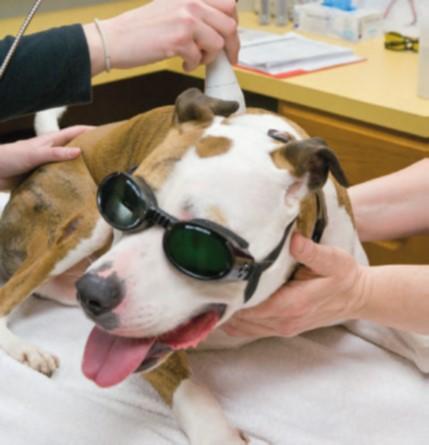We can now offer Laser Therapy using our New Class IV Laser.
Conditions which can be treated with the laser are:-
Acute Conditions
- Wounds
- Allergies
- Infections
- Cuts/ Bites
- Inflammation
- Tooth Extraction Pain Relief
- Sprains, Strains & Fractures
- Post-Surgical Healing / Pain Relief
Chronic Conditions
- Degenerative Joint Disease
- Inflammatory Bowel Disease
- Periodontal Disease
- Lick Granulomas
- Geriatric Care
- Hip Dysplasia
- Feline Acne
- Tendonitis
- Arthritis
What are the benefits, how does it work?
Anti-Inflammation
Laser Therapy reduces inflammation with vasodilation, activation of the lymphatic drainage system, and reduction of pro-inflammatory mediators. As a result, inflammation, erythema, bruising, and oedema are reduced.
Analgesic Effect
Laser Therapy of diseased and damaged tissue produces a suppression of pain receptors, an increase of the stimulation threshold, and an increased release of tissue endorphins. The result is a decreased patient perception of pain.
Accelerated Tissue Repair and Cell Growth
Photons of light from lasers penetrate deeply into tissue and accelerate cellular reproduction and growth. Laser light increases the energy available to the cells so that they can take on nutrients and get rid of waste products more quickly.
Improved Vascular Activity
Laser light significantly increases the formation of new capillaries in damaged tissue. This speeds the healing process, resulting in more rapid wound closure.
Increased Metabolic Activity
The energy from photons of laser light is captured by chemical complexes within cells resulting in activation of enzyme systems and increased energy delivered into cellular metabolic processes.
Trigger Points and Acupuncture Points
Laser therapy stimulates muscle trigger and acupuncture points without mechanical invasion to provide musculoskeletal pain relief.
Reduced Fibrous Tissue Formation
Laser Therapy reduces the formation of scar tissue.
Improved Nerve Function
Slow recovery of nerve functions in damaged tissue results in numbness and impaired limbs. Laser therapy accelerates nerve cell regeneration.
Immunoregulation
Therapy laser photons have an effect on immune systems status through stimulation of immunoglobins and lymphocytes. Laser therapy energy is absorbed by chromophores (molecular enzymes) that react to laser light. The enzyme flavomono-nucleotide is activated and starts the production of ATP, which is the major carrier of cellular energy and the energy source for all chemical reactions in the cells.
Faster Wound Healing
Laser light stimulates fibroblast development. Fibroblasts produce collagen, which is predominant in wound healing in damaged tissue. Collagen is the essential protein required to replace old tissue or to repair tissue injuries. As a result, laser therapy is effective on open wounds and burns.


